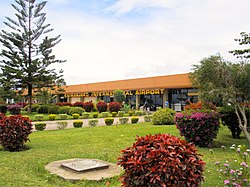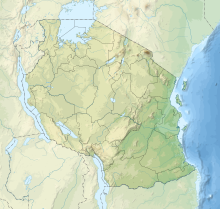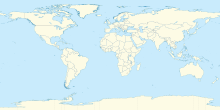Kilimanjaro International Airport
 From Wikipedia - Reading time: 9 min
From Wikipedia - Reading time: 9 min
Kilimanjaro International Airport | |||||||||||
|---|---|---|---|---|---|---|---|---|---|---|---|
 | |||||||||||
| Summary | |||||||||||
| Airport type | Public | ||||||||||
| Owner/Operator | TAA | ||||||||||
| Serves | Moshi, Kilimanjaro Region and Arusha, Arusha Region | ||||||||||
| Location | Hai District, Kilimanjaro | ||||||||||
| Elevation AMSL | 2,932 ft / 894 m | ||||||||||
| Coordinates | 03°25′46″S 37°04′28″E / 3.42944°S 37.07444°E | ||||||||||
| Website | kilimanjaroairport.go.tz | ||||||||||
| Map | |||||||||||
 | |||||||||||
| Runways | |||||||||||
| |||||||||||
| Statistics (2015) | |||||||||||
| |||||||||||
Kilimanjaro International Airport (KIA) (IATA: JRO, ICAO: HTKJ) is in Hai District, Kilimanjaro Region, Tanzania. The airport serves the cities of Arusha and Moshi. The airport handled 802,731 passengers in 2014[1] and serves mainly regional flights, and a few long-haul services due to its importance as a leisure destination. It is the largest airport in northern Tanzania by size and passenger volume.
Overview
[edit]
Many international visitors also go to national parks in Tanzania, to the Indian Ocean coast, to islands such as Zanzibar, and to Lake Victoria, reflected in the routes of connecting flights. With a runway almost 12,000 feet (3,700 m) long, the airport can handle aircraft as large as Boeing 747s and Antonov 124s.[3] The airport served 665,147 passengers in 2012, a 3.7 percent increase over 2011.[4] The airport served 802,731 passengers in 2014, of whom 45 percent were international, 38 percent domestic, and 17 percent transit.[1]
On 19 February 2014, the governments of Tanzania and the Netherlands signed a grant arrangement to rehabilitate the airport, including its aprons, taxiways, and terminal building. The total cost of the project was expected to be €35.5 million, with €15.0 million funded by the Netherlands and the remainder by Tanzania. The design phase, completed by 2014, was financed entirely by the Dutch government.[5] In November 2015, renovations began at the airport, aimed at doubling its capacity from 600,000 passengers to 1.2 million annually. The renovation work was being done by BAM International, a subsidiary of the Royal BAM Group in the Netherlands, at a cost of US$39.7 million, and was expected to be completed in May 2017.[1]
History
[edit]Kilimanjaro Airport cost US$13 million to build. It opened on 2 December 1971, with construction financed by a long-term loan from the Italian government.[6]
In 1998, it became the first international airport in Africa to be privatised. It is operated by the Kilimanjaro Airport Development Company.[3]
The airport facilitates the tourism industry for visitors travelling to four regions: Arusha Region, Kilimanjaro Region, Mara Region and Manyara Region. Attractions in the regions include Mount Kilimanjaro National Park, Arusha National Park, Tarangire National Park, Lake Manyara National Park, the Ngorongoro Conservation Area, and Serengeti National Park. The airport bills itself as the "Gateway to Africa's Wildlife Heritage".[3]
Airlines and destinations
[edit]The following airlines maintain regular, scheduled passenger and cargo service to and from Kilimanjaro International Airport.[7][8]
Notes:
1: Air France's inbound flights from Paris to Kilimanjaro make a stop in Zanzibar. However, the airline does not have traffic rights to transport passengers solely between Zanzibar and Kilimanjaro.
2: KLM's outbound flights from Kilimanjaro to Amsterdam make a stop in Dar es Salaam. However, the airline does not have traffic rights to transport passengers solely between Kilimanjaro and Dar es Salaam.
3: Qatar Airways' outbound flights from Kilimanjaro to Doha make a stop in Dar es Salaam. However, the airline does not have traffic rights to transport passengers solely between Kilimanjaro and Dar es Salaam.
4: Turkish Airlines' inbound flights from Istanbul to Kilimanjaro make a stop in Zanzibar. However, the airline does not have traffic rights to transport passengers solely between Zanzibar and Kilimanjaro.
Accidents and incidents
[edit]On 18 December 2013, an Ethiopian Airlines Boeing 767 (ET-AQW) flying from Addis Ababa to Kilimanjaro International Airport (runway length 11,811 feet) mistakenly landed at Arusha Municipal Field (runway length 6,102 feet), overrunning the end of the runway[14]
References
[edit]- ^ a b c d Ihucha, Adam (28 November 2015). "Kilimanjaro airport upgrade to double its capacity". The EastAfrican. Nairobi. Retrieved 29 November 2015.
- ^ "TRAFFIC MOVEMENTS STATISTICS ANNUAL REPORT FOR THE YEAR 2014". Tanzania Airport Authority. Archived from the original on 5 March 2016. Retrieved 14 September 2015.
- ^ a b c "KIA at a Glance", Kilimanjaro Airport Development Company
- ^ (in Swahili)"Waziri wa Uchukuzi awasilisha Bungeni Makadirio ya Mapato na Matumizi ya Fedha ya Mwaka 2013/2014", Tanzania Ministry of Transport, page 60 Archived 10 March 2014 at the Wayback Machine
- ^ "Tanzania and the Netherlands to rehabilitate KIA", Kilimanjaro Airports Development Company
- ^ "Tanzania Airport Opens", The New York Times, 2 December 1971
- ^ "Airline Operators". Kilimanjaro Airport Development Company. 2014. Archived from the original on 3 November 2014. Retrieved 24 September 2014.
- ^ "Qatar to fly to KIA daily". The East African. Retrieved 28 August 2018.
- ^ "Air France Resumes Kilimanjaro Service From Nov 2024". Aeroroutes. Retrieved 20 June 2024.
- ^ "Air Tanzania resumes Entebbe / Bujumbura service from late-August 2018".
- ^ "Flydubai to begin flights to Kilimanjaro by October - Hotelier Middle East". 18 June 2017.
- ^ "Istanbul New Airport Transition Delayed Until April 5, 2019 (At The Earliest)". 9 April 2019.
- ^ Liu, Jim. "Uganda Airlines resumes operation from late-Aug 2019". Routesonline. Retrieved 24 August 2019.
- ^ Thome, Wolfgang H. 18 December 2013. Ethiopian Airlines in Unscheduled Landing at Arusha Municipal Field. eturbo news.com Retrieved 18 December 2013
 KSF
KSF

